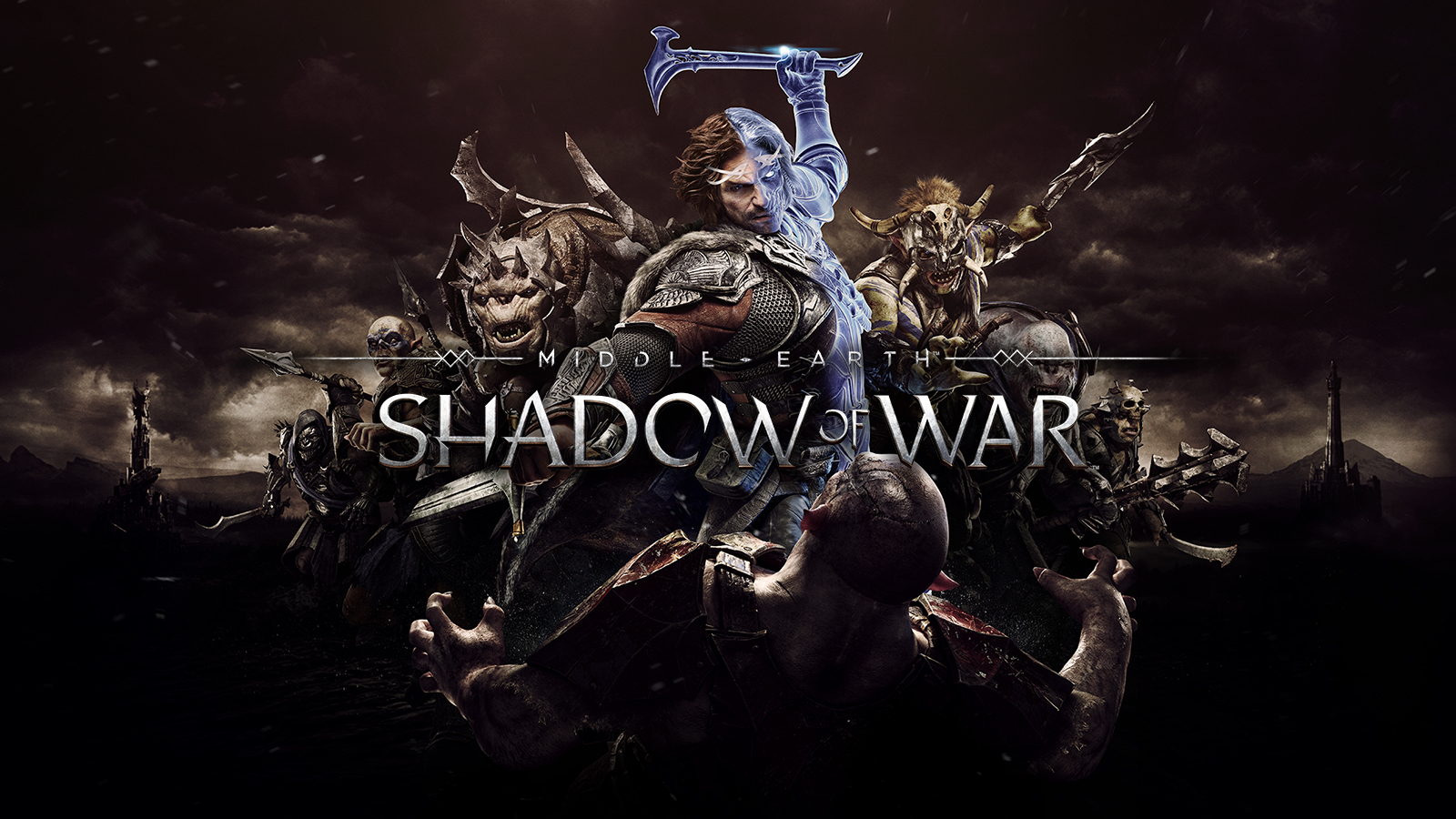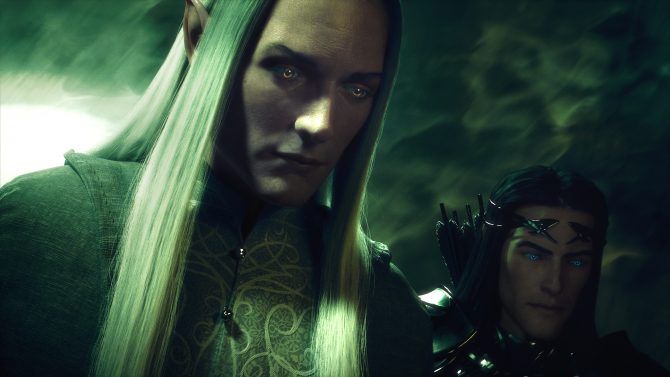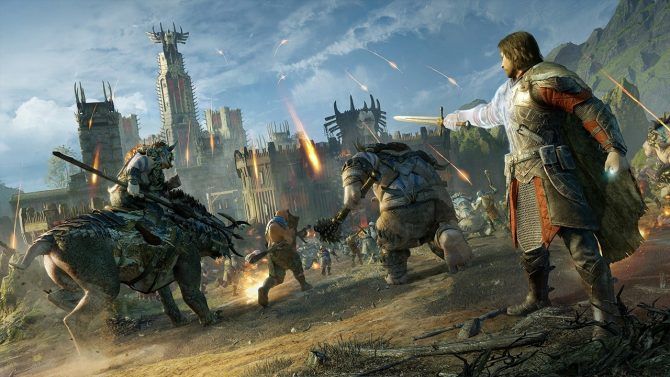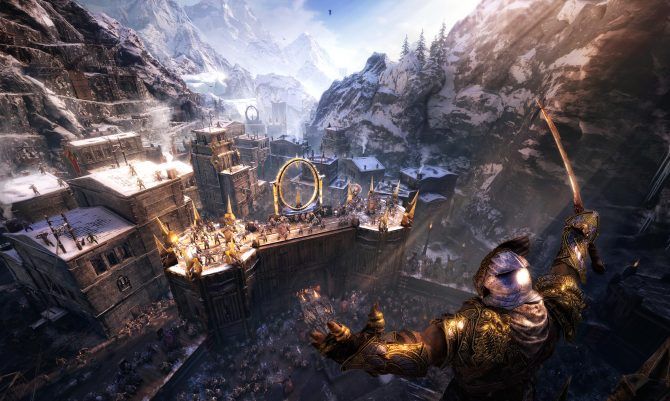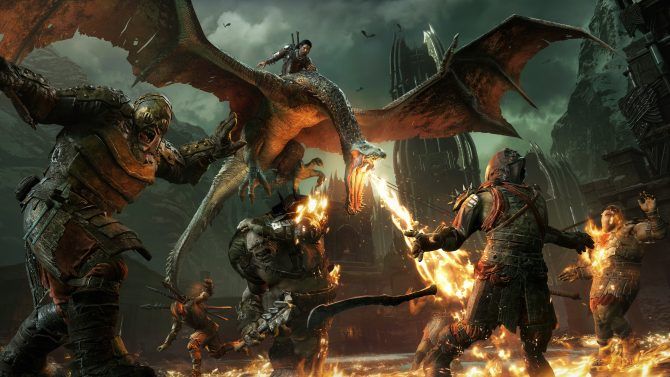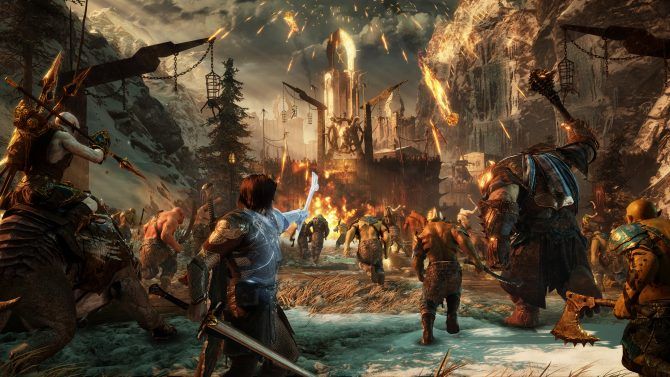Many sequels often try to go down the route of being "bigger and better" than the game that preceded it. While on paper the idea of adding more depth and blowing up a game to a larger scale in a sequel is a good idea, sometimes that added size loses what it was that made the prior game in the series so good in the first place.
With Middle-earth: Shadow of War, Monolith Productions has found a way to add more depth, scale, and complexity in all areas of the game while still keeping intact what it was that made the first entry -- Shadow of Mordor -- so enjoyable to begin with.
Shadow of War picks up after the events of Mordor with us once again playing as the ranger Talion and the elf lord Celebrimbor who inhabits Talion's body. In the opening moments of the game, we find Talion and Celebrimbor crafting a new Ring of Power which will allow them to gather their own army and go toe-to-toe with Sauron's forces. This premise of building up your own army of Orcs, Uruks, and Olog-Hai is fairly straightforward, but I found it to be satisfactory.
Throughout the course of the campaign you run into a variety of well-known figures from Middle-earth, such as the spider -- now taking the form of a woman -- Shelob, the Witch-king (along with his Ringwraith followers), and the beguiling Gollum. The involvement of these characters within the narrative of Shadow of War ranges from being highly important to being being little more than a cameo. Major players like the Witch-king made the narrative that much more interesting, while someone like Gollum only seemed to be thrown in this time because of how well-known his character is.
Personally, I found the story of Shadow of War to be more interesting than that of Shadow of Mordor, but I still wouldn't consider it the game's strength. Most of the supporting characters that aid Talion and Celebrimbor are forgettable and the introduction of Shelob as one of the main supporting characters struck me as odd since most of her inclusion in the narrative ends relatively early. There are certain flashbacks featuring the Ringwraiths and Sauron that I really adored, but more often than not I was just looking forward to getting back into running around the world.
Of course, hardcore Middle-earth fans might have more of love or hate relationship with the story than I did. I'm not the biggest Lord of the Rings fan, but I know that there are many out there who might dislike some of the liberties that Monolith Productions took with the lore in Shadow of War. If those who have reservations with these elements of the game could come into it realizing that this story is separate from the main canon of the books, then I think there's great enjoyment to be had.
As I alluded to, the real reason to play Shadow of War is found within its gameplay. Combat is once again just as sound as it was within Shadow of Mordor, and returning players should feel right at home as soon as they begin playing. Taking on vast groups of Orcs and other various enemies is equal parts challenging and fun while also boasting a certain rhythm to it.
That said, I did find the combat within Shadow of War to get stale from time-to-time. Unfortunately, almost nothing was added to mix up the swordplay from that of its predecessor. Variations of this style of combat have also been seen from both the Batman: Arkham series and Mad Max, and it's starting to feel a bit too heavily leaned-upon by Warner Bros.-published titles. My gripes are less with the quality of the combat system itself, and more with the fact that not enough has been done to iterate upon it.
Fortunately, many other aspects of Shadow of War have seen drastic shakeups compared to that of the first game. The much praised Nemesis System that was at the core of Shadow of Mordor has returned but is now tweaked to accommodate a new army-building mechanic. With a Ring of Power at the disposal of Talion and Celebrimbor, you can convert enemy warchiefs, captains, and overlords to fight for you instead. Upon bringing these once foes into your own army, you can then use them to infiltrate other enemy warchiefs in the pursuit of later backstabbing them, send them out to kill other fellow Orcs, or use them to battle one another with the victor growing to a higher level.
This new twist culminates most notably when leading your army to assault an enemy fortress. Throughout the world of Shadow of War, each of the game's areas will contain a large stronghold that initially will be controlled by enemies. After putting together an army of your own that is of a high enough level, you then lead an all-out attack on these enemy forts in the attempt to gain them as your own. Fortress assaults are easily the best part of Shadow of War, as the scale and outright insanity that ensues during these battles are unmatched by any other titles I've played in recent memory.
[pullquote]"I can easily see myself coming back to Shadow of War months after release, simply due to how much I love the attacking and defending of fortresses. "[/pullquote]
If you succeed in your attack on these strongholds, you then can place a member of your own army into power to control the fortress from then on. What's very unique about this is that the look and style of the fort will change depending on which of the seven tribes that the Orc you place into power belongs to. From a fortress decorated in gold, to one that looks like its walls are covered in blood, each version of your fortress will differ greatly depending on who you choose to serve as captain of that castle. It's a small feature, but one that I personally found a lot of enjoyment in.
After taking over a new fort, strengthening it for defensive purposes is quite important, as you'll sometimes find your forts under siege from enemies looking to take back the citadel for themselves. These counterattacks don't take place until the conclusion of the campaign. But when they do begin happening, this loop of building up your army to take over a fort, followed by then defending your newfound home, is a ton of fun and makes it easy to get lost in the minutiae and micromanaging of your own forces.
I thoroughly enjoyed the Nemesis System found in Shadow of Mordor, but the changes that have been made in War have proven to hold my attention much longer. I can easily see myself coming back to Shadow of War months after release, simply due to how much I love the attacking and defending of fortresses. This will be the aspect of the game that I think fans will be talking about for awhile.
[pullquote]"I thoroughly enjoyed the Nemesis System found in Shadow of Mordor, but the changes that have been made in War have proven to hold my attention much longer."[/pullquote]
Much like in Shadow of Mordor, Orcs once again steal the spotlight through their often hilarious dialogue and awesome designs. Each Orc, Uruk, or Olog-Hai that I found in Shadow of War were vastly different from one another, which is extremely impressive given the number of them that you'll run into throughout the campaign. No two characters looked the same, no lines of dialogue were repeated, and no voice actors sounded the same. As a result, this helped draw me into the world that much more.
As for other creatures within Shadow of War, Graugs and Caragors make their return as mountable beasts but are this time joined by Drakes, the fire-breathing dragons of Middle-earth. Mounting these creatures to take down your enemies is a ton of fun, but mounting a Drake takes things to another level. Flying high above your enemies and raining fire upon them is about as satisfying as you'd expect. Whenever I had a chance to mount a Drake in battle, I'd take it.
Shadow of War really hits its stride with the aforementioned fortress assaults, but unfortunately falls flat with many of its other story-related missions. While there were occasionally missions that I thoroughly-enjoyed due to an enemy that I was fighting or the location in which it took place, I'd say that a majority of the story-related tasks in Shadow of War felt pretty repetitive. I could count on one hand the number of story missions that made me say "wow" after completion, and that's pretty disappointing.
As for side missions, they are littered throughout the world of Shadow of War, but again don't feel all that unique from each other. Outside of the Nemesis-related objectives that you can do endlessly, the only other main form of side quest involves replaying sequences from Celebrimbor's past. These missions are typically short and would occasionally contain unique objectives that could give you bonus skill points or gems upon completion, but they aren't anything that I found to leave a lasting impression on me.
Collectibles are also scattered around the entirety of Shadow of War. From random items detailing further Middle-earth lore, to shattered memories of Shelob's past that allow you to see into her story a bit more, the world of Shadow of War has a good amount of stuff to track down for those that are interested.
[pullquote]"No two characters looked the same, no lines of dialogue were repeated, and no voice actors sounded the same."[/pullquote]
I have yet to talk about the new, deeper RPG mechanics, which are one of my favorite aspects of Shadow of War. Specifically, the skill trees that are available to you within the sequel allow for much more customization than in Shadow of Mordor, and let you cater best to how you want to play. Almost every skill within the game has three sub-skills that allow you to modify or alter the ability to which it belongs. You can only choose one of these three sub-skills to equip at a time however, which means you'll have to decide which fits the best given the way you want to play.
Gear also makes its return from Shadow of Mordor but this time comes in six different slots: sword, dagger, bow, armor, cape, and ring rune. Each of these gear slots allow you to swap out different items of higher attack, defense, or stealth value, along with each item sometimes containing different bonuses. Additionally, you can augment each different gear slot with different gems of varying categories that you'll collect. These will grant you various percentage bonuses depending on which class of gem it falls under.
All of this added depth to the game's systems are fantastic, and really allow you to mix and match to find what it is that you like personally. It's impressive that Monolith has been able to stack all of these systems on top of one another to make them work together as a cohesive unit. The sheer depth that Shadow of War offers in its gameplay options is staggering.
While I'm at it, now is a good time to bring up the microtransactions within Shadow of War since there has been so much talk surrounding this aspect of the game ahead of launch. While I can understand the frustration that some fans might have with these being present in a single-player game, at no point in my playthrough were the microtransactions ever shoved in my face. In fact, the game didn't even tell me about them being present until some 30+ hours into my playthrough, at which point I remembered they were even available.
After scrolling through the purchasing options that were buyable in the game's market, I didn't feel the slightest bit compelled to buy anything that I couldn't earn myself through playing the game. I can comfortably say that I think the fans' reaction to microtransactions has been a bit blown out of proportion. Much like myself, I don't expect many other players to feel the need to buy anything to have a better time with Shadow of War.
I've talked about the locations in Shadow of War in passing a handful of times, but the different landscapes that you traverse within Mordor are much more diverse than that of the first game. From snow-topped mountains, to lava-filled pits, to even the vast Gondorian city of Minas Ithil, Shadow of War fixes one of my largest issues with the first game which was its lack of different locations. While each area is still filled with roughly the same missions and collectibles, it's nice to mix up the scenery more often.
[pullquote]"Shadow of War finds its success in perfectly expanding upon everything that made Shadow of Mordor so great. "[/pullquote]
Despite my overall adoration for Shadow of War, there's one egregious fault that I have yet to mention: the opening act of the game is incredibly bland and drags on far too long. For the first four to six hours of gameplay -- depending on how quickly you complete the story missions -- you must slog through a series of repetitive tasks and uninteresting story missions. In this span, you don't gain access to many of the new aspects of Shadow of War such as the building of your army or the fortress assault missions. I understand that this first portion of the game is mainly used to set up the larger narrative of Shadow of War, but it lasts for far too long to be enjoyable. I'd go as far to say that you could easily cut off these early hours of the game and you wouldn't miss anything at all.
Shadow of War finds its success in perfectly expanding upon everything that made Shadow of Mordor so great. Despite the game's slow start, once you get into the weeds of Shadow of War's systems, you'll find yourself engrossed and addicted to its satisfying gameplay loop for hours on end. This increased depth along with the much larger scale of the world and battles within Shadow of War make it a far better game from top to bottom than that of its predecessor.
Middle-Earth: Shadow of War
- Franchise
- The Lord of the Rings
- Released
- October 10, 2017
- Developer(s)
- Monolith
- Publisher(s)
- Warner Bros. Interactive
- Genre(s)
- Action RPG
- ESRB
- M for Mature: Blood and Gore, Intense Violence

